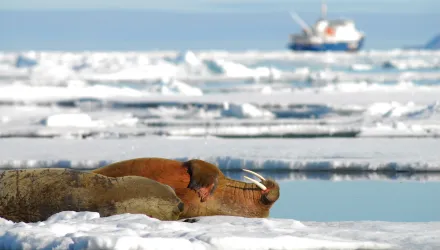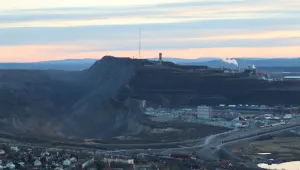24 Ideas for a Sustainable and Secure Arctic
1. Alexander Zaytsev
Gas Flaring in the Russian Arctic: Stop Burning Money
2. Brittany Janis
Empowering Indigenous Innovation in the Face of Climate Migration
3. Brittney Melloy
From Threatened to Thriving: Using Technology to Preserve Arctic Indigenous Languages
4. Cayla Calderwood
'Current' Events in Arctic Shipping: Monitoring's Potential to Optimize Trade Routes
5. Colleen Narlock
Preserving the Polar Pharmacy
6. Colleen Golja
Are We Ready for an Arctic Aerosol Experiment?
7. Daniel Bicknell
Insuring and Ensuring Sustainable Development in the Arctic Ocean's International Waters
8. Edouard Aubry
The "Arc-tech" of Tomorrow - Empowering a New Generation of Arctic Techies
9. Erin St. Peter
Frozen Markets: Improving Arctic Vessel Insurance Under Uncertainty
10. Gillian Christie
Relocation Done Right: A Community Approach for Local Culture Preservation
11. Henna Trewn
Bundled Power: Transitioning Remote Communities to Clean Energy
12. Jane von Rabenau
From Dumping Ground to Breeding Ground: Ocean Plastics in the Arctic
13. Kai Dittmann
Walk the Line: Greenland's Mining between Sovereign Wealth and Direct Spending
14. Katie Segal
Waste as an Arctic Resource: Tackling Waste Volume while Solving Energy Challenges
15. Linh Nguyen
An Arctic Cleanup Fund: Tackling Plastic Pollution One Ship at a Time
16. Luis Villegas
No Youth, No Future: Arctic Citizen Journalists Network
17. Martha Lee
An Arctic Tourist Trap? Seizing Opportunities for Indigenous Economic Growth
18. Michelle Chang
Drilling Down into Sustainable Resource Extraction in Alaska
19. Nick Eidemiller
Northwest Passage Response Network
20. Patrick Lynch
Great Rivers of the Arctic: Filmmaking as a Catalyst for Community Engagement and Conservation
21. Reine Rambert
Reimagining the Arctic Landscape for Film and Creative Pursuits
22. Ross Eisenberg
Financing Solid Ground: Permafrost Thaw-Resistant Communities
23. Sohum Pawar
Clean, Safe, Affordable Power: A Nuclear Option for the Arctic
24. Zac Smith
Shrinking the North: Providing Mental Health Services Through Telepresence Technology



